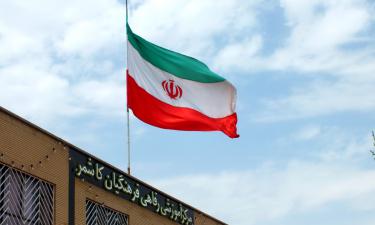"Koran is our Constitution"
 Hundreds of Muslims came out to participate in a major protest on Saturday in France.
Hundreds of Muslims came out to participate in a major protest on Saturday in France.
Shouting “The veil is my choice”, the protestors expressed their negative attitudes towards the French government’s plan to ban headscarves (hijabs) in schools.
At the end of last year, French President Jacque Chirac reported that wearing religious attributes in public schools will be prohibited. According to the President, such measures are aimed at protecting the authentic characteristic of the French high society.
While urging his supporters to join the protest, head of the French Muslim party Mohhamed Lyatresh, has stated the following, “We are saying “NO” to the anti Islamic law, “NO” to the headscarf ban.”
A similar manifestation has already taken place in December of last year. Back then, participants demanded to acknowledge hijab as “a symbol of freedom of one's personal will.” It should be noted however that headscarves are not the only religious attributes that have been banned. Interestingly, it is only with the case of hijab banning that Muslims became so alarmed.
A ban on headscarves appears to be just the outer side of a clash between Muslims and French authorities. The essence of the problem concerns the fact that many of the Western European countries including France, all face the issue of placing Muslims in a society at large. For France, however, this issue appears to be of utmost importance, since more than 10% of its 60 million population are Muslims.
Antagonistic moods between Muslim population and other residents of the Western European countries have been cultivating in the course of several decades. In the beginning, German, French and British authorities did not want to interfere in Muslims’ affairs. First of all, the authorities preferred to stay aside in order to avoid being accused in banning freedom of religion. Secondly, Muslims did not demonstrate any activity in politics.
However, many things have changed for the past decade. Rapid Muslim population increase in the Western European countries (mainly due to high birth rate and immigration from Middle East and Northern Africa) had to ignite political ambitions of community's leaders. In addition, after the events of September 11, Western Europeans started to treat Muslims with caution. Such facts are not being officially reported. However, constant reports about “Al Qaida’s” new plans to commit terrorist acts in Europe surely do not help in establishing promising relationships between Muslims and authorities. This problem overlaps with another one.
Living standard of Muslims (especially of immigrants) appears to be significantly lower than that of Europeans. On the one hand this leads to increasing crime rate. On the other, this also causes radical moods to spread among the young generation of Muslims.
European leaders are trying to search for an answer to solve this problem. Most importantly, they need to reach some sort of mutual understanding with the Muslims. Last year, for instance, a Union of French Muslims has been founded. The Union's main task is to spread ideas of “moderate Islam” among the Muslim younger generation. The following question however remains unanswered: “Are Muslims ready for this?”
During the Union's elections, of May of last year, 40% of seats were acquired by radicals. They clearly stated that “Koran is their Constitution” and that the sacred laws are much more important than those outlined by the government.
Many French people are not even trying to hide their negative attitude towards Muslims. According to them, all Muslims who immigrate to France do so because of special benefits and nothing else. They want to get free apartments, have free medical benefits and whatnot. But at the same time, they refuse to abide by the governments' rules and regulations.
Clearly, present day methods to “solve” such problems do not result in anything positive. On the contrary, it only makes radical moods to spread even faster. In this case, one should not wait for long until the next terrorist attack happens.
This is exactly what authorities fear the most. They fear such uncontrolled spread of radical ideas among Muslims. However, the most recent attempt of the French government to ban religious attributes was criticized by people not affiliated with any Muslim groups. In the end, we are faced with a dead end. Authorities still have to find a way out.
Subscribe to Pravda.Ru Telegram channel, Facebook, RSS!





